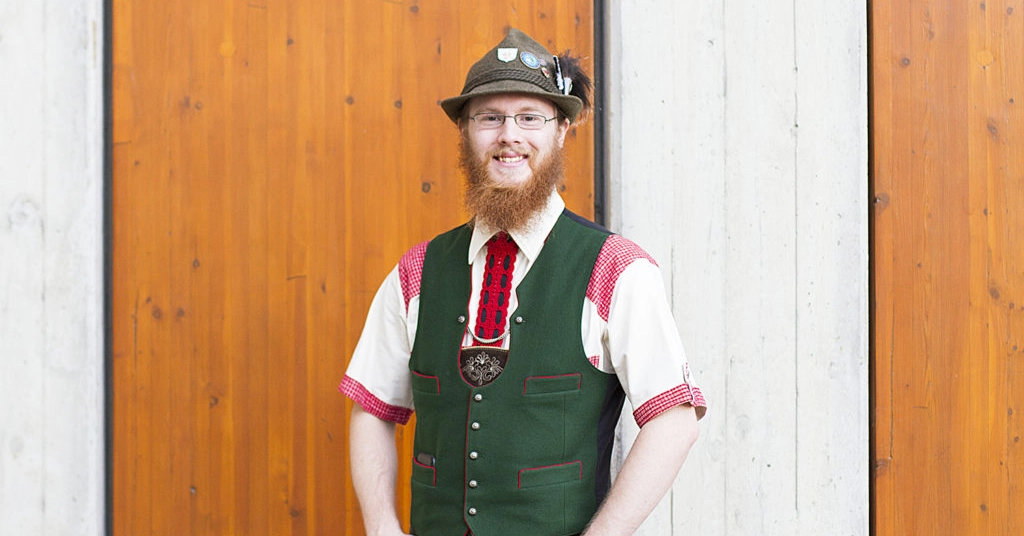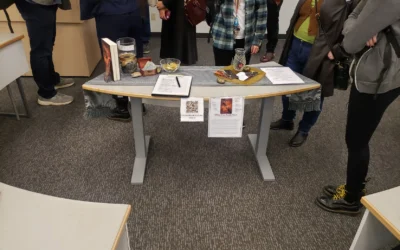Let’s start with your introduction, why you were interested being involved in the German Club, and how it came to be what it is today.
My name is Reiss Kruger. I’m in my fifth and final year of my bachelor of arts, and I’ve been involved with the MacEwan German Club more or less since day one of me being here at MacEwan. The club, in its current incarnation, kind of took off around 2011-2012, with various changes of leadership between then and now. Currently, the president is Luke Ratz, who took over after I stepped down. There was a previous incarnation, I believe, of the German Club years ago, but it had fallen off the map [or] died out, and then was revitalized, as tends to happen with student clubs sometimes.
Yeah, that’ll happen. What kind of activities was the club doing back then versus the types of things you can see in the club nowadays?
Well, I’d say now is probably pretty close to how it started off. We’ve always wanted to do lots of events, but now we have the right kind of people to help pull that off. We do movie nights, which you popped in on. We attempt to organize outings into the wider community for German events, or just go eat German food. We go to the German Canadian Cultural Center sometimes for events that go on there.
We had our first MacEwan Oktoberfest this year, which was awesome! It was a great success. We had the Bavarian Schuhplattlers, a German folk dance group of which I’m a member, perform. Everybody loved that. We had a big ol’ barrel and barrel-rolling events. It was hilarious to watch people try to get the best times zigzagging around a course.
Barrel-rolling. Maybe you can elaborate a little more, because I’ve got an idea, but I would love to hear exactly what’s involved.
Basically we took a big ol’ barrel, which was actually a wine barrel we got from a winery in B.C., which was…it was a monster! We turn it on its side and we have two poles marked with balloons and people had to figure-eight their way around it once, and then whoever had the best time won a prize. People were doing that in the background while other events were going on, and it was entertaining.
Nice, and these barrels obviously had some weight to them?
You could not turn on a dime with them — that’s for sure!
That sounds fun. Where did that event take place, and what other things have you guys done in the past?
Oktoberfest took place on the ground floor of the Robbins building on campus, and a large part of German culture is beer and revelry — just good times. Oktoberfest is, of course, something specifically Bavarian that has evolved into being associated more widely with Germany. But we figured, “Let’s tap into this,” because it’s a great thing that’s part of German culture that can get people excited about it. Sometimes it’s difficult motivating students, but when you say there’s beer, then they tend to line up for it.
With this event being held on campus, was there any difficulty getting beer served in the Robbins? How did you guys figure out being allowed to get that done for the event?
It’s because the main food, drink and everything else providers in the school are run by Aramark. The advantage of that is we go through them, and we don’t have to sort anything else out. We say, “This is what we want,” and they get back to us with like, “This is what we can provide,” and we negotiate that, and then it’s out of our hair. We don’t have to get the liquor license. We don’t have to find separate service people, because they already have a license, and they handle everything.
That makes it quite convenient in that respect. When you were setting up the event, did they have preferred options available?
The club executives actually had a beer tasting night to choose from the available beers, and if I remember correctly, we had a Erdinger Dunkel, which is a dark beer. We had Früli, which is not actually a beer, I think. It’s kind of an alcoholic fruity beverage. I think we went for two German beers and Früli because it’s good, regardless of being German, and then a few Canadian beers as well.
Something that’s interesting to me, and perhaps some people don’t know about, is the Beer Purity Law that exists for brewers in Germany. Can you tell me about that, and why that makes German beer what it is?
Well, it’s actually the Bavarian Purity Law, or Reinheitsgebot, specifically for Oktoberfest beers where they have very exacting standards for the process by which the beer is made and the alcohol level, which is actually higher than regular beer. Oktoberfest beers are usually around seven per cent, but some go up to nine per cent. In the same way, there are certain rules by which we classify something as a wine from a certain region. Bavaria has this standard to which it holds itself for brewing, which puts it a step above the rest in some people’s eyes.
In regards to the future of the German Club, has the club met to discuss where you want to take the club, or are there any other plans the execs may have?
Well, we have had a couple general meetings and exec meetings regarding what people want to do, because we want to respond accordingly. Nobody wants to hold an event that no one shows up to, which is very easy to do at a university where people are already busy — and if they’re not interested, why would they show up? Movie nights are an easy thing, because people can come out, and we have the subtitles on for people who don’t speak the language. They still get exposure to German filmmaking. There are lots of great films which would otherwise be inaccessible to people. I joked in the club meeting about showing the original, uncut version of Das Boot, which is like six hours long, but everybody voted that one down.
Although one could argue putting together an extended event that would span a few different dates, definitely with some beer involved.
Yeah, maybe over the space of Reading Week. Next year, we want to do Oktoberfest, to make it an annual event, and we’ll probably start planning relatively soon, because last year’s took close to a year of on-and-off planning. Because it was the first one, we wanted to get it off the ground. This year, we don’t have access to some of the same grants we had, because some rules have changed, so we’ll have to get more sponsored and run more fundraising, but it was considered a big success and there’s nowhere to go but up in terms of any event that involved alcohol. We also are looking at events happening at the German Cultural Centre near the end of April — specifically, Heimatabend, which is very difficult to describe if you’ve never been to one. It’s kind of German folk dance meets stand-up comedy meets slapstick acts meets contemporary dance. It’s like a play that involves a mix of contemporary and traditional dance, usually parodying all kind of things, but we Germanify them.
It sounds like a good mix to expose a newbie to the culture. Now, in terms of the German language, what does the club offer for brushing up speech or learning key phrases to be used on an upcoming trip to the country?
The German professors here at MacEwan are always very enthusiastic and support the club, giving us opportunities to make announcements in class, so people are aware of the existence of the MacEwan German Club. In the past, there have been study groups that we’ve organized, and interest in those waxes and wanes from those currently taking German language courses. The film-showing events are nice, because you get exposure to the sound of German. It helps people pick up new words or remember forgotten sayings. I had a friend who sat in on the last one, who hadn’t taken German in a few years, and said it was good hearing it again. We aren’t going to hold weekly meetings unless the demand exists, but we have periodic study sessions that are loosely organized among students.
When was the last time you were in Germany, and where do you recommend for students looking to travel to Europe?
I went in 2009, and my trip consisted of landing in Frankfurt and basically going straight south while touring all through Bavaria. If you ever get a chance, the Bavarian Alps are just gorgeous, but my advice travelling through Germany is just pick an area you want to explore and just go do it. Unless you’re really interested in architecture or history, I’d say avoid the big cities. Go through the tiny towns with unchanged streets for hundreds of years, and stay in the bed & breakfasts. It’s the kind of history that is impossible to get anywhere here in North America. It’s amazing walking down a hill on a cobblestone road to eat in a bar that’s been open for 700 years.
That’s some good advice that I’ll take for my Euro trip I’m planning next summer. Okay, three last questions:
- What is your favourite word to pronounce in German?
- What is your favourite German beer?
- What is your favourite part of German culture?
- Geisteswissenschaften, which refers to the “sciences of spirit” or an investigation into what it means to be human. It’s often used by German philosophers.
- This one is hard to answer because I don’t actually drink, which I’m sure sounds amazing coming from a former president of the German Club, but I wear the short pants, so that should make up for it in that regard. Most of my friends really like Erdinger Dunkel, so by proxy, I’ll have to go with that one.
- It’s a hard choice between Germany’s incredible contribution to the world of philosophy, through Leibniz, Fichte, Hegel, Marx — the list goes on — andSchuhplattler,which was immortalized in National Lampoon’s European Vacation, where Chevy Chase’s character gets into a fight on stage. It’s a folk dance that involves the slapping of thighs, shoes — other people!
That’s a good media reference. Thank you for that!
This interview has been edited for length and clarity.
Photo by Angela Johnston





0 Comments